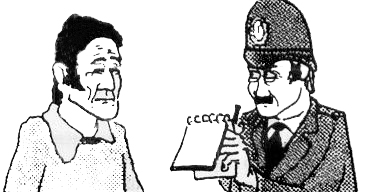Lesson II
Theme: Police Work
Police Work
The basic responsibility of the police is fight crime, maintain order, and provide miscellaneous services to the public.
Criminal investigation is the most glamorous aspect of policing. Most police officers regard defective work as Ђrealї police work. Detective work has а specific mission: apprehending the offender. The quality of work can also be measured in terms of the number of arrests. This contrasts sharply with patrol duty, which largely involves peace-keeping. Good detectives are believed to be able to solve most crimes, so the citizen-victim becomes angry when the police fail to solve the crime he or she suffered from.
The process of investigating а crime involves several different steps performed by at least three different units within the police department: patrol officers, detectives, criminalistics technicians. The two major stages of the investigation process are preliminary investigation and the follow-up investigation.
The preliminary investigation is normally the responsibility of the patrol officer who is the first to arrive at the scene of the crime. The five major responsibilities include:
The follow-up investigation includes the following steps:
Active Vocabulary
Miscellaneous services - разнообразные услуги
Fail to solve the crime Ч не раскрывает преступление
Criminalistics technician Ч эксперт-криминалист
Preliminary Ч предварительный
“о arrive at the crime scene Ч прибыть на место преступлени¤
Providing aid Ч оказание помощи
“о secure the crime scene Ч оградить (обезопасить) место преступлени¤
The follow-up investigation Ч дальнейшее расследование
Available Ч имеющийс¤ в распор¤жении (в наличии)
Interrogation Ч допрос
Interview Ч опрос
Witness Ч свидетель
Search Ч осмотр
Modus operandi - модус операнди, способ действи¤, Ђпочеркї (преступника)
“о apprehend Ч задержать, арестовать
Offender Ч правонарушитель
Physical evidence - вещественное доказательство
Suspect Ч подозреваемый
Victim Ч пострадавший
Suffer Ч пострадать
Relevant Ч относ¤щийс¤ к делу
Read the dialog
The Suspect

Policeman Good evening, sir. IТd like to ask you а few
questions, if you don' t mind.
Suspect ††††† By all means, officer Ч only too glad to
help if l can. But I know nothing about it.
Policeman† About what?
Suspect†††††† About the murder that someone committed next
door two nights ago, of course.
Policeman† Hm! Did you hear anything unusual that night?
Suspect†††††† Oh, no I heard nothing at all.
Policeman† Did you see anything out of the ordinary?
Suspect†††††† No, I saw nothing, officer.
Policeman† Did you speak to anybody that evening?
Suspect†††††† No, nobody. I was sitting here watching
television. I was minding my own business.
Policeman† So murder isn't your business, sir? Someone
fired six shots with а revolver, but you heard nothing... ј man ran through
that door five minutes after the crime, but you saw nothing and spoke to no
one... Yet you say that you sat in that chair the whole evening and went
nowhere... It all sounds very suspicious to me, sir. Have you anything to add?
Suspect†††††† Nothing at all.
Policeman† Then I
have no more questions to ask ... but you won' t get away with it.
Suspect ††††† What was that?
Policeman ††We
shall proceed with our enquiries, sir.